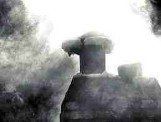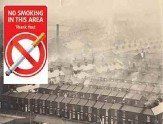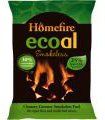Coal ~ Fires & Fuel
As the cold and credit crunch bite, more and more people are turning to open fires to keep themselves warm and cut down on skyrocketing fuel bills. But it isn't only about saving money; there's something satisfying and primal about building your own fire – perhaps because it dates back to the dawn of our species. Looking into the flames also has a strong aesthetic, almost hypnotic, appeal.
As well as their romantic appeal, open fires can also save you money. Recent figures from the Solid Fuel Technology Institute (www.soliftec.com) suggest that burning wood alone, or mixed with coal, costs around half that of gas or oil – and that's leaving aside free supplies that we all use.

Unsurprisingly, sales of wood-burning and multi-fuel stoves are up 40 per cent on last year, according to the Solid Fuel Association (www.solidfuel.co.uk). The president of the Coal Merchants Federation reported a 20 per cent Increase in sales, with fellow members enjoying similar rises in business. And the National Association of Chimney Sweeps noted a "resurgence" in demand for their services – to the point that some firms now have two - or three-month waiting lists.
Most older properties will have a fireplace, but often it will be blocked off with plasterboard or bricks. Fortunately, these can be removed fairly easily. But before you light a fire, it's important to check that the chimney is clear and hasn't been capped. It might also be necessary to hire a builder to fix any deteriorated mortar pointing in the chimney.
Another thing to find out is whether you live in a smoke-control area – a common regulation in most large towns and cities in the UK. You can check this at
www.uksmokecontrolareas.co.uk. If you live in a smokeless zone, you'll have to use smokeless fuel (Anthracite or Homefire, for example), not wood or standard coal.
If you're worried about green issues, then a wood-burning stove or log fire is the way to go. Wood is considered carbon neutral because it only releases the CO2 captured by the growth of the tree. And an efficient multi-fuel fire (half wood and half smokeless fuel) produces less carbon dioxide than a gas condensing boiler.
The NEW Eco-friendly smokeless fuel, with 30% renewables and up to 25% less CO2 than housecoal
These renewable materials come from plants that absorb much of the carbon dioxide that is released when the fuel burns & emits only a fifth of the smoke compared to ordinary house coal
HETAS
http://www.hetas.co.uk
You must ensure that your stove is installed by a recognised competent person who is appropriately qualified in the installation of stoves and that the installation complies with all local, national and European building regulations.
We strongly recommend using a Hetas registered installer (www.hetas.co.uk) and in Ireland a registered installer from INFO - the Irish Nationwide Fireplace Organisation (www.fireplace.ie). In the UK installations of wood burning stoves and multi fuel stoves, even if only a simple stove replacement in an existing flue system, are subject to the requirements of local building regulations and by law are notifiable to your local authority Building Control department
List of services
-
PRODUCT APPROVALItem link List Item 1
HETAS operates a government approved scheme for testing and approval of solid fuel and biomass appliances. The HETAS Guide is published annually and provides installers and specifiers with a useful list of approved appliances, chimneys and associated equipment.
-
INSTALLER REGISTRATIONItem link List Item 2
Registered installers are trained and approved to UKAS standards and can self certify that their work complies with the relevant building regulations. They have access to free Technical Handbooks, advice and updates, competitively priced insurance and equipment.
-
APPROVED CHIMNEY SWEEPSItem link List Item 3
weeps who are members of the National Association of Chimney Sweeps ( NACS), the Guild of Master Chimney Sweeps and the Association of Professional and Independant Chimney Sweeps (APICS) are listed in the HETAS Guide and can use the HETAS approved sweep logo.
-
APPROVED RETAILERSItem link List Item 4
The HETAS approved retailer scheme provides kudos for stove shops and showrooms, and aims to increase safety whilst promoting the reputation of good quality retailers. Approved retailers are listed in the HETAS Guide and on the HETAS website
-
MICROGENERATION CERTIFICATION SCHEMEItem Link
The government approved Microgeneration Scheme (MCS) is designed to build consumer confidence in the growing renewables sector. HETAS runs both MCS installer and MCS appliance schemes covering biomass and solar thermal technologies.
DEFRA
Smoke Controlled Area's
Under the Clean Air Act, local authorities may declare the whole or part of the district of the authority - to be a smoke control area.

It is an offence to emit smoke from a chimney of a building, from a furnace or from any fixed boiler if located in a designated smoke control area.

It is also an offence to acquire an "unauthorised fuel" for use within a smoke control area unless it is used in an "exempt" appliance ("exempted" from the controls which generally apply in the smoke control area).
The current maximum level of fine is £1,000 for each offence.
Your local authority is responsible for enforcing the legislation in smoke control areas and you can contact them for details of any smoke control areas in their area. They should also have details of the fuels and appliances which may be used.
How to contact your Local Authority for location of smoke control areas Authorised fuels.
Exempt appliances are appliances (ovens, wood burners and stoves) which have been exempted by Statutory Instruments (Orders) under the Clean Air Act 1993 or Clean Air (Northern Ireland) Order 1981.
These have passed tests to confirm that they are capable of burning an unauthorised or inherently smoky solid fuel without emitting smoke.
Ordering Fuels Online.
KentCoal ~T.White Coalmerchant is proud to be affiliated to The Coal Merchants Federation.
It's is not only in your interest but ours too ~ That you obide by your local authority in relation to the types of fuels your are able to burn - in your region.
As a mail order customer, it is your responsibilty to check that you are indeed purchasing the correct fuels - to obide by the regulations in place.
Kentcoal ~ T.White Coal Merchant, cannot be held responsible for incorrect purchases,
we will not knowingly supply any customer known to be in a smoke controlled zone ~ any fuels - un permitted.
We have given every customer the ability to check & obide herewith.

Some Hot Facts !!!
If like us ~ your interested in all solid fuel facts, check out the Soliftec web site. It contains many Fuel Facts.
While the Gas and Electricity supplies continue to rise by the world dependance of oil, Traditional solid fuel Cookers Stoves and general Heating are now seriously being looked at by home owners as an alternative source.
Here at KentCoal we are constantly advising our customers with free impartial advise ~ to gain the most effiecncy and cost savings we can.
If you are a high user and can store large quantities, talk to us on our summer deals to maximise your buying potential.
If you are a mail order customer, Increase the quantity, you'll save vast amounts per bag ~ overall.
Shipping costs are high impact ~ so look at being greener and saving on your carbon footprint at the same time.
If you are buying a cheap low performance fuel or are on a budget, talk to us, we will advise you on alternative products that may out perform your current favoured fuel ~ for just a little more you might gain a lot !
All in all, we're here to supply you at our best possible prices and make sure we match the right fuel for your needs and budget
We can't express the importance of fuel types and safety enough. 9 times out of 10 Chimney fires are caused through neglect or bad advice.
Residues of burning " GREEN Timber " ( Un seasoned raw timber ) can leave oily deposits - that can build up in the chimney ~ resulting in a blaze chimney fire, when temperatures in the chimney reach ignition, it's too late to call the sweep out !
Having the chimney swept regularly and burning seasoned logs reduces the risk hugely. The sensible approach to " Open Fire Fuel " would be to use a high heat output products such as
(Homefire, Homefire Ovals or Ecoal) Then add well seasoned logs for flame and effect. Don't try to achieve the same heat output from logs alone. Most of the flame goes up the chimney rather than radiating out, as a red hot glow - like from the products mentioned above.
Another good tip for prevention, is to slow down the initial heat up. Cracks and damage occur when temperatures rapidly increase !
Risk of cracking liners, mortars and flue's etc, is greatest from temperatures of 500 to a 1000 degrees. Slowing down the mass heat output from initial fire up and allowing the chimney to expand gradually will reduce the potential to cause damage, reducing the cavities and cracks reduces the risk of chimney fires and may save you a bundle in building repairs.
So - If you are lucky enough to have your own renewable source of green timber, please fully season the timber and mix with manufactured coals to obtain the heat.
If you dont and want to be greener ~ Buy
Don't build an epic bonfire in the hearth - that hugely increases risks of chimney fire
Do have your chimney swept regularly & do take the advice from the sweep as to how often ~ given the fuel you are burning.
Contact Info
6 Blackthorn Drive
Aylesford
Kent
ME20 6NR
Company Registration: 1443776
VAT No.: 203-6753-81










